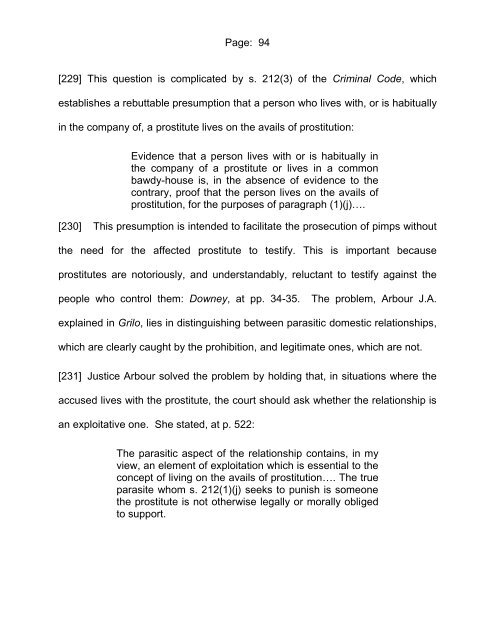Canada (Attorney General) v. Bedford, 2012 ONCA ... - York University
Canada (Attorney General) v. Bedford, 2012 ONCA ... - York University
Canada (Attorney General) v. Bedford, 2012 ONCA ... - York University
You also want an ePaper? Increase the reach of your titles
YUMPU automatically turns print PDFs into web optimized ePapers that Google loves.
Page: 94[229] This question is complicated by s. 212(3) of the Criminal Code, whichestablishes a rebuttable presumption that a person who lives with, or is habituallyin the company of, a prostitute lives on the avails of prostitution:Evidence that a person lives with or is habitually inthe company of a prostitute or lives in a commonbawdy-house is, in the absence of evidence to thecontrary, proof that the person lives on the avails ofprostitution, for the purposes of paragraph (1)(j)….[230] This presumption is intended to facilitate the prosecution of pimps withoutthe need for the affected prostitute to testify. This is important becauseprostitutes are notoriously, and understandably, reluctant to testify against thepeople who control them: Downey, at pp. 34-35.The problem, Arbour J.A.explained in Grilo, lies in distinguishing between parasitic domestic relationships,which are clearly caught by the prohibition, and legitimate ones, which are not.[231] Justice Arbour solved the problem by holding that, in situations where theaccused lives with the prostitute, the court should ask whether the relationship isan exploitative one. She stated, at p. 522:The parasitic aspect of the relationship contains, in myview, an element of exploitation which is essential to theconcept of living on the avails of prostitution…. The trueparasite whom s. 212(1)(j) seeks to punish is someonethe prostitute is not otherwise legally or morally obligedto support.
















